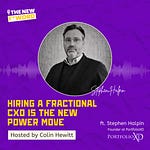The Founder Who Learned the Hard Way
Wood built Receipt Bank from a startup to a £500 million exit to IRIS Software Group in 2024. During that journey, Receipt Bank eventually migrated to NetSuite as they scaled. Wood now says if today's technology had been available then, they would have stayed on their modular stack rather than making that expensive, complex transition.
As someone who's lived through a painful ERP transition, Wood sees the opportunity to help businesses avoid this pain. The idea for Translucent centres around the fact that the general ledger is essentially an API layer, and works well for many businesses. There is a constantly evolving app ecosystem marketplace that enables businesses to plug in ones to fit their unique use cases. By providing this multi-entity system, businesses can have multiple Xero entities in the UK and Australia, a QuickBooks setup in the US, and a Pennylane in France. Businesses can use the tools that they know, yet create reports in one place, avoiding or delaying the ERP migration until a much more significant scale than would have been possible before.
Translucent's core capabilities include automated group reporting with real-time FX conversion, intercompany reconciliation, treasury consolidation across currencies, and unified search across all entities. The platform operates as a data warehouse that syncs and harmonises information from Xero, QuickBooks, Sage, and Pennylane, enabling enterprise-level consolidation without forcing companies to abandon familiar SMB accounting tools.
The market response has been favourable. Translucent achieved 1,000 Xero entities in just 168 days - claimed to be the fastest any Xero app has reached this milestone. The company has raised £7.7 million across pre-seed and seed rounds, attracting notable investors including Craig Walker (Xero co-founder/former CTO) and Gary Turner (Xero co-founder/former UK MD) as board members.
The Fractional CFO Movement Is Accelerating This Shift
The fractional CFO movement is driving a fundamental change in how growing companies approach their finance stack. These strategic partners bring experience from their time at multi-entity organisations, and they're proving that modular finance stacks are not just viable–they're smarter.
“Our experience of the market is most people do not want to leave Xero. They want to stay, but they have a problem. That problem may be forecasting, it may be intercompany automation, prepayments, consolidated reporting, working at AP groups, across the group. It can be all sorts of different things, but normally they are running this, you know, these multiple zeros, this multi entity setup, and they have a burning problem. And what we try to do is to help them with that first problem”
Unlike permanent CFOs who might default to familiar enterprise solutions, fractional CFOs see the same problems across dozens of clients. They watch companies struggle with ERP implementations, and they are starting to see alternative paths becoming viable, bringing both significant time and cost savings.
This positions them perfectly to challenge the old orthodoxy. When a fractional CFO with experience across 20+ implementations says, "you don't need NetSuite yet," that carries weight that transforms boardroom conversations.
The Hidden Reality: ERPs Are Failing at Scale
The statistics behind ERP implementations tell a sobering story that fractional CFOs are increasingly aware of. According to Gartner research, 55-75% of ERP projects either fail outright or don't meet their intended objectives. Only 23% of all implementations are considered successful by organisations' own standards.
Major companies are reversing course on massive ERP investments. Lidl scrapped its €500 million SAP implementation after seven years, reverting to legacy systems. Avon's $125 million SAP failure saw 33% of sales representatives quit rather than struggle with the complex interface. Mission Produce lost $22.2 million in gross profit when their ERP implementation left them unable to track basic inventory operations.
Cost overruns represent perhaps the most shocking revelation. Organisations experience an average 189% budget overrun, meaning ERP projects typically cost nearly three times the initial estimates. Timeline delays compound the financial pain, with failed projects experiencing schedule overruns averaging 230%.
Notably, only 33% of companies report satisfaction with their ERP systems, and 56% of organisations have a "high degree of purchase regret" over their largest technology purchases, with ERPs frequently topping the list.
The Rise of ERP Fatigue Drives Simplification
A significant shift is underway as companies experience "ERP fatigue" - exhaustion with monolithic systems' rigidity, costs, and complexity. By 2027, IDC forecasts that 75% of global businesses will begin replacing monolithic systems with modular, API-driven solutions.
The symptoms of ERP fatigue are consistent: inability to adapt quickly to business changes, implementation timelines measured in years rather than months, heavy interfaces that frustrate users, vendor lock-in that limits innovation, and customisation bottlenecks that constrain operations.
Gartner's evolution from promoting "postmodern ERP" to "composable ERP" reflects industry recognition that one-size-fits-all solutions no longer work.
Why the "Xero-NetSuite Gap" Is Now an Advantage
There used to be a genuine gap where companies outgrew Xero or QuickBooks but weren't ready for full ERP complexity. That gap has largely disappeared thanks to modern tools that solve specific problems without requiring complete system replacement.
Translucent handles multi-entity reporting, unified search, and intercompany reconciliation - but other tools are also adding powerful additional functionality to the multi-entity tech stack. Float recently launched its consolidated short-term cashflow forecasting and reporting to bring direct method 13-week cashflow reports across the whole organisation.
These aren't simply band-aid solutions. They're purpose-built tools that often work better than ERP modules because they're designed for specific use cases rather than trying to be everything to everyone. They're also improving at a faster pace with the advent of AI.
The Cost of Delaying Is Now Massive Savings
The traditional logic suggested that delaying ERP migration would eventually force expensive, rushed implementations. The opposite has proven true. Companies that resist the ERP pressure are saving hundreds of thousands - or millions - while their competitors struggle with complex migrations.
Michael put it like this:
“What we try to do at Translucent is allow them just to buy the apps or the modules that they need at a very cost-effective price…without having to get bogged down into a project of, ‘I’ve got to migrate my accounting software. But you don’t need to rip up everything else you’ve got just to now scratch that itch. You can keep everything else in place and solve that problem.”
The numbers tell the story: NetSuite implementations start at £200,000 for mid-market companies and can easily exceed £1 million with customisation, training, and disruption costs. A typical Xero + Translucent + Float + specialist tools approach might cost £5,000-£10,000 annually - a fraction of the ERP investment with far better user adoption and faster implementation.
More importantly, that modular investment preserves optionality. If a company eventually needs true ERP capabilities, it can migrate individual functions over time rather than forcing a "big bang" replacement that puts the entire business at risk.
With 56% of organisations experiencing high purchase regret and failure rates exceeding 60%, recommending an ERP migration is increasingly difficult to justify. Meanwhile, the modular approach offers clear benefits: faster deployment, lower risk, incremental investment, and the ability to course-correct without organisational trauma.
Today, by developing their knowledge of a modular-based tech stack, CFOs are positioning themselves as strategic advisers who help companies avoid unnecessary complexity rather than consultants who default to enterprise solutions. This differentiation becomes a competitive advantage as the market recognises that complexity often kills growth.
The Bottom Line for Modern CFOs
The evidence suggests that traditional ERP implementations pose unacceptable risks for growing companies. With failure rates exceeding 60%, average cost overruns of 189%, and only 33% customer satisfaction, the promise of integrated systems too often delivers organisational trauma instead of transformation.
The companies abandoning their ERP investments aren't failures - they're pioneers of a more pragmatic approach to enterprise technology. They're proving that modular, best-of-breed solutions can deliver enterprise-level capabilities without the complexity typically associated with them.
For fractional CFOs advising growing companies, the message is clear: challenge the ERP orthodoxy. The technology landscape has evolved to the point where the "Xero-NetSuite gap" is no longer a limitation. Companies that resist the pressure to "graduate" to complex ERPs often find themselves more agile, more profitable, and better positioned for sustainable growth.
When your clients hit those traditional ERP trigger points - multiple entities, complex reporting needs, or scaling operations - remember Michael Wood's insight: if today's technology had been available during Receipt Bank's growth, they never would have made the NetSuite transition. That's not a failure of ambition; it's the wisdom of experience.
🎙️ Want to dive deeper?
If you enjoyed these insights, dive deeper by listening to full episodes of The New F*Word Podcast here.
If you’re finding this newsletter useful, why not share it with a fellow finance friend? And if you haven’t subscribed yet, don’t miss out on some of the exclusives we’ve got coming your way. We’re on the lookout for more forward-thinking finance leaders to become strategic partners for businesses.
Subscribed
💸 Want a smarter way to manage cash?
My passion is helping you keep track of where your business stands at any moment, so you can make smarter, more confident decisions. At Float, we focus on mastering short- to medium-term cash flow management. If you want to give it a try, click the button below!
Keep that boat afloat!
Colin 👋












Share this post